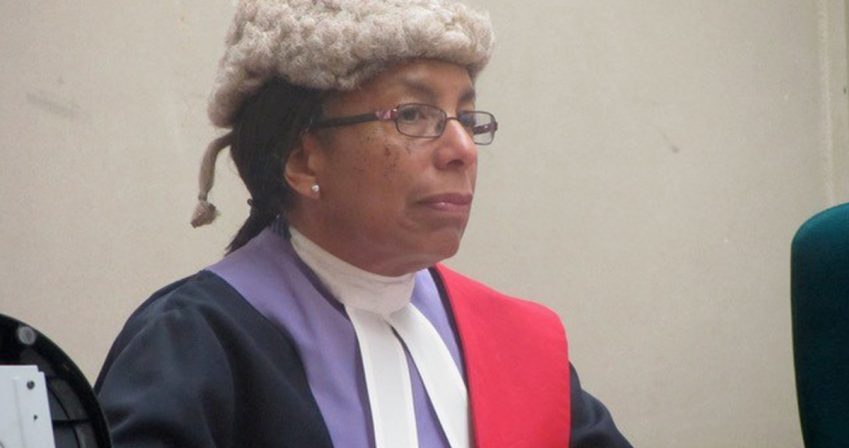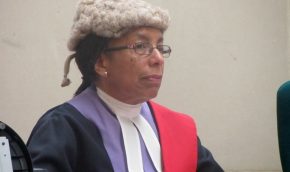First woman of Afro Caribbean heritage to be appointed to the Circuit Bench of England and Wales and first woman to sit on the Appeal Court for Bermuda.
Celebrating Diversity at the Bar
- Introduction
- Diversity Timeline
- Edward Akufo-Addo
- Obafemi Awolowo
- Joyce Bamford-Addo
- Solomon Brandaranaike
- Charlotte Boaitey-Kwarteng
- Joseph Ephraim Casely Hayford
- Eugenia Charles
- S Chelvan
- Thomas Morris Chester
- Learie Constantine
- Edward Cragg Haynes
- Patricia Dangor
- Coomee Rustom Dantra
- Ezlynn Deraniyagala
- Gifty Edila
- Taslim Olawale Elias
- Martin Forde
- Arthur Dion Hanna
- Ma Pwa Hmee
- Alexander Isbister
- Sibghatullah Kadri
- Seretse Kharma
- Moleleki Didwell Mokama
- Tunde Okewale
- Ashitey Ollennu
- Vallabhbhai Patel
- Lily Tie Ten Quee
- Ponnambalam Ramanathan
- Edward Richards
- Khushwant Singh
- Manjiit Singh Gill
- Teo Soon Kim
- Leslie Thomas
- Stella Thomas
- Leonard Woodley
Home › Celebrating Diversity at the Bar › Patricia Dangor
Her Honour Patricia Dangor
Call 1970, Middle Temple
Patricia Dangor, nee Richards, is of black parentage, her father coming from Guyana and her mother from Bermuda. She was born in Bermuda at a time when racial discrimination was entrenched in the law and enforced by a white oligarchy. She attended racially segregated primary and secondary schools.
At home, education and hard work were paramount as was courtesy and respect for all. When Patricia was three months old, her father, E.T. Richards left for England to study law. In 1946, he was called to the Bar at Middle Temple and returned home where he practised as a barrister and attorney for the next 39 years.
In 1960, Patricia came to England to complete her education and joined Middle Temple to read law. In 1964, she married Bucker Dangor, a physicist of Indian descent from South Africa with whom she went on to have two daughters.
In 1970, Patricia was called to the Bar at the Middle Temple but encountered difficulty finding pupillage due to her race, gender and motherhood. A personal appeal by her father to Sir Elwyn Jones secured pupillage in his chambers at Lamb Building in the Middle Temple. There she was fortunate to have Gary Flather as her Pupil Master who encouraged the values of hard work, persuasive advocacy and courtesy towards clients.
Patricia would have liked to have secured a tenancy in Middle Temple. However, she again experienced her race and gender being held against her and found herself growing her practice from a windowless storage cupboard in Lamb Building.


Her Honour Patricia Dangor
In 1973, three years after being called to the Bar, Patricia secured a tenancy in Gray’s Inn where she remained throughout her career practising as a legal aid barrister specialising in criminal and family law. In those early years, racial prejudice and discrimination in the justice system were endemic, adversely impacting on black criminal defendants and victims of domestic violence in the family courts. The enactment of The Children Act 1989 saw Patricia’s practice grow in this area and gave her the opportunity to speak to the Society of Black Lawyers at Leeds University.
With encouragement from judges before whom she appeared, her family and her old pupil master, Patricia applied to sit as a Circuit Judge and was appointed as a Recorder in 1996. In 1999, she was the first woman of Afro Caribbean heritage to be appointed to the Circuit Bench of England and Wales.
On her first day sitting as judge at Harrow Crown Court, Patricia was stopped by the security guard at the gate of the car park who enquired “What are you doing here. Are you the cleaner, a social worker, probation officer?” Patricia pointed at the parking permit on her windscreen. In frustration he asked, “Who are you then?”. She said,
I am the Judge
He opened the gate immediately.
Patricia sat in Willesden and Wandsworth County Courts and Isleworth and Harrow Crown Courts. At Harrow Crown Court she very much enjoyed the scheme that welcomed local state school children to visit the court to meet the judges and encourage them to consider law as a profession.
Throughout her career. Patricia worked to open a route to the judiciary for those from ethnic minority backgrounds. She served on various committees set up to address racial inequality across the legal profession. These included the Bar Race Relations Committee, Mrs Justice Bracewell’s Central Monitoring Committee, and Lord Neuberger’s Working Party on Entry to the Bar. However, at a Minority Lawyers Conference organised by the Law Society, she was disappointed to come came away with the impression that some of those present did not believe the appointing authorities were genuine about diversity on the bench and as a result were not applying. While there are now more ethnic minorities lawyers, black judges are still few and far between.
Patricia was called to the Bermuda Bar in 1973. She sat as a magistrate, a Registrar and in 1995 as a Puisne Judge. In 2014, she was appointed to sit on the Appeal Court for Bermuda, the first woman to do so.
In 2017 Patricia retired from the Circuit Bench and the Court of Appeal for Bermuda. She has subsequently given presentations to university law students and has continued to encourage people from all backgrounds to pursue a career in the law. The Ministry of Justice statistics for 2019 recorded that of the 6417 judges in England and Wales 92.6% were white. Patricia hopes that this great under representation of black and ethnic minority judges, particularly in the highest courts in the land, will change and soon.
By Patricia Dangor